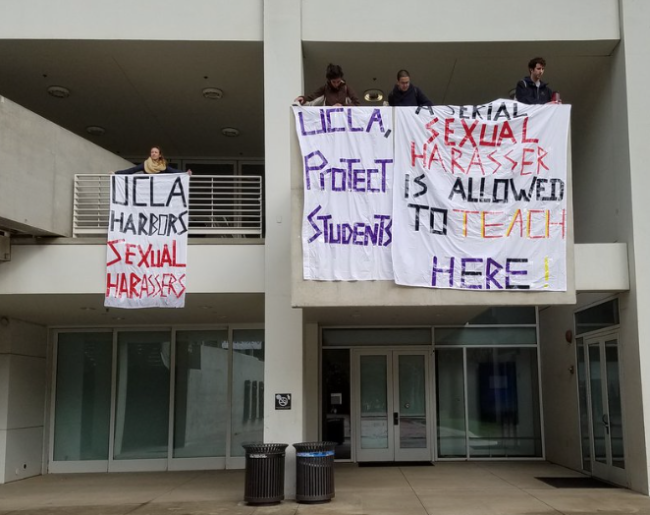You have /5 articles left.
Sign up for a free account or log in.

Recent UCLA protest against Professor Gabriel Piterberg's return to campus after a suspension for alleged sexual misconduct.
After years of bad news about sexual harassment and assault involving professors within the University of California, its Board of Regents voted this week to strengthen the systemwide Faculty Code of Conduct’s policies against such behavior.
Specifically, regents approved an amendment to the code making sexual harassment and assault violations of faculty responsibilities. Previously, sexual misconduct did not explicitly constitute a violation.
The board also clarified the deadline by which campus chancellors must initiate disciplinary proceedings against a faculty member accused of misconduct, putting it at three years. It also eliminated any timeline for making reports of harassment and assault involving faculty members.
The system’s Berkeley campus faced criticism in 2015 for not taking harsher action against a well-known professor of astronomy accused of repeatedly sexual harassing students over many years. The professor, Geoff Marcy, eventually resigned, but reports of perceived “slaps on the wrists” to system professors accused of assault kept coming. Gabriel Piterberg, a professor of history at the Los Angeles campus, for example, was allowed to return to teaching after a brief suspension and a fine, even though the university settled with two graduate students who said he’d repeatedly harassed them and forced himself on them. He never admitted to any wrongdoing.
Most recently, documents obtained by The Mercury News in San Jose showed that more than 110 university employees were determined to have violated the system’s sexual misconduct policies during the past three years. The San Francisco campus had 26 cases, according to the newspaper, while Los Angeles had 25 -- including a French professor who wrote hundreds of love poems to a graduate student. That campus also reportedly saw a cancer researcher send sexually explicit jokes to colleagues, even after having been accused of sexual harassment twice before.
The university system has made attempts at reform, however, with President Janet Napolitano declaring that it become a “national leader” in prevention and response to sexual misconduct. As part of that effort, she appointed a joint committee of administrators, faculty leaders and students to examine the system’s policies and Academic Senate bylaws governing faculty conduct and discipline.
The policy changes approved at this week’s board meeting were recommended by that committee and reviewed by Napolitano and at the campus level. They’ll “further the university’s goals of ensuring an equitable and inclusive education and employment environment free of sexual violence and sexual harassment,” according to the meeting agenda.
There’s also a new timeline for involuntary leave for professors found to be an immediate threat to the campus community. Instead of charges being brought within 10 days -- deemed by the committee to be “untenably” quick -- a chancellor must now inform the faculty member within five days of the allegations being investigated, along with grievance and other information.
"This strengthens the ability of a chancellor to take this interim measure, if appropriate, when investigating an allegation against a faculty member," said Claire Doan, university spokesperson.
The changes, effective by July 1, also say that the chancellor must be informed about an alleged violation of the code when it’s reported to a department chair or higher up the administrative chain, including the coordinator for Title IX of the Education Amendments of 1972, which prohibit gender discrimination in education, in cases of alleged sexual misconduct. Any disciplinary action must be initiated within three years of the report. But there is “no limit on the time within which a complainant many report an alleged violation.”
That's something that victims' advocates have supported elsewhere, since some may need significant time before they're ready to report misconduct. Disciplinary action must come with a finding of probable cause, and all policy is still subject to the system's other due process protections for faculty members.
California Lieutenant Governor Gavin Newsom, a Democrat, was at this week's meeting said, "There seems there was a level of tolerance which was outrageous and frankly I still question the lack of accountability with some of that, and it's on all of us," ABC News reported.




